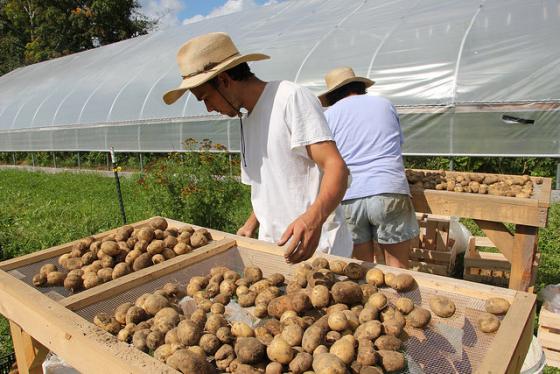Posted February 1, 2017 at 05:09am by Christian Feuerstein
For the Third Consecutive Year, Sterling College is #1 for Real Food

Sterling College has once again been confirmed as the top college in the United States that serves food on campus that is local, sustainable, humane, and fair-trade. This is the third consecutive year Sterling has had this achievement.
This classification comes from the Real Food Challenge, which surveyed over 200 colleges and universities throughout the United States. After reviewing all of the food used in the Sterling College kitchen from July 2015 to June 2016, the college found that 65% of its food met the real food qualification for production methods.
This year’s survey also revealed that 53% of Sterling’s food comes from farms within a 150-mile radius of the College; this includes the 35% of food that comes from its own on-campus farm, one of the first collegiate farms in the country. The campus-grown food is up from 20% last year.
“Our campus is a living laboratory to reshape the nation’s food system into one that is just, fair, and doesn’t exacerbate climate change,” said President Matthew Derr. “Our entire campus puts environmental stewardship at the core of our curriculum, work, and community, and that includes the food we choose to grow, purchase, and eat.”
Student Emma Enoch ’17 is pleased by the findings. Enoch, a Sustainable Food Systems major, analyzed Sterling College’s campus food for the 2015-16 school year. “It’s not just the food,” she says. “It’s every piece of the on-campus dining puzzle. Sterling has had trayless dining, composted food waste, as well as reusable mugs, plates, and silverware, for years. It’s also about what we don’t have—no vending machines, no convenience stores, no fast-food outlets on campus. Our food system has been examined from seed to compost.”
Nicole Civita, faculty member in Sustainable Food Systems and the Assistant Director for the Rian Fried Center for Sustainable Agriculture & Food Systems, says that this statistic is especially significant. “While we use our campus as a model ecosystem to grow and prepare our own food, we also work in a close and interdependent way with the farmers and artisan food producers of the region,” she said. “Our investment in local small farms and supporting the working landscape of Vermont is critical to our leadership as food stewards.”
Last year, Sterling College was at 75% real food. Two of Sterling’s local suppliers, Misty Knoll Farms and Cabot Creamery, no longer fit the Real Food Challenge’s threshold for small farms. Civita says, “Directing the College’s food budget to our regional foodshed is so important to us that we often choose to buy from a local producer that we believe to be enhancing the resilience of our place-based food system, even if doing so may decrease our Real Food score.”
The findings come as Sterling College is completing a major renovation of its main community kitchen, funded by both a USDA grant and an anonymous donor.
Civita continues, “The Sterling Kitchen produces delicious meals centered around real food that satisfies the diverse dietary needs of our campus community — omnivore, vegetarian, vegan, and gluten-free. Our ethic of food stewardship is paired with a commitment to serving wholesome, flavorful meals.”
Sterling College’s Rian Fried Center for Sustainable Agriculture & Food Systems has over 130 acres of farm and garden. Students grow crops, manage livestock, and use both tractors and draft animals to power the farm. The Center also includes an edible forest garden, the Alfond Draft Horse Barn, hoop houses, and a sugar house and sugarbush for maple syrup production.
Sterling College’s kitchen is at the center of the community’s life. All students must complete at least one week of dish chores per semester; the College often invites the local community to potlucks and community pancake breakfasts; the Nutrition class debuts new recipes to be taste-tested and rated by the campus once per semester; and students often host “kitchen takeovers” in which they cook a special meal, usually featuring international cuisine.
The Real Food Challenge is an annual challenge for colleges and universities to have 20% real food on campus by 2020. Its goal is to shift $1 billion in institutional food spending to real food.
--##--
ABOUT STERLING COLLEGE
Founded in 1958 in Craftsbury Common, Vermont, Sterling College is the leading voice in higher education for environmental stewardship. The College was among the first colleges in the United States to focus on sustainability through academic majors in Ecology, Environmental Humanities, Sustainable Agriculture & Food Systems, and Outdoor Education. Sterling College is accredited by the New England Association of Schools and Colleges and is one of only eight federally recognized Work Colleges in the nation.
